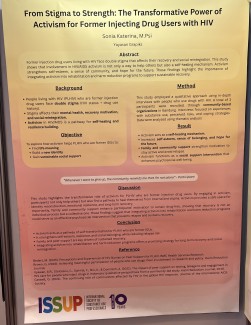From Stigma to Strength: The Transformative Power of Activism for Former Injecting Drug Users with HIV

Injection drug users (IDUs) living with HIV/AIDS (PLWHA) often face multiple stigmas stemming from their HIV status and history of drug use. This stigma can impact their mental health, motivation to recover, and social integration. This study highlights how involvement in HIV/AIDS activism serves as a tool of self-transformation for PLWHA who are former IDUs. Through a phenomenological approach, this study explores participants' experiences in finding the meaning of life, building a new identity, and obtaining ongoing social support.
The results showed that activism not only provided opportunities for PLWHA ex-IDU to help others, but also became a self-healing mechanism. Participants felt an increase in self-esteem, a sense of belonging to the community, and hope for the future. Support from family and the activist community played an important role in strengthening their motivation to remain active and avoid substance reuse. Furthermore, activism serves as a vehicle for the development of social support interventions that can improve the psychosocial well-being of PLHIV and strengthen their resilience to triggering factors for relapse.
These findings highlight the importance of integrating activism approaches in rehabilitation and harm reduction programs for former injecting drug users living with HIV. Thus, activism can be a strategy that not only supports relapse prevention but also promotes sustainable recovery for PLHIV who are former IDUs.
Keywords: Activism, PLHIV, injecting drug users, self-transformation, recovery